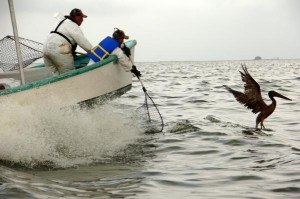It is a question that has lawyers and many others on the U.S. Gulf coast buzzing: Will BP strike a massive deal to settle the remaining claims over the Gulf of Mexico well blowout?
BP could be nearing a settlement of federal claims with the U.S. Department of Justice, but people tracking the case closely say the company and coastal states, especially Louisiana, might still be far apart.
So unless the talks with the states quicken or the judge delays the process in the hope a far-reaching deal will happen, the civil trial of the year will get under way on Feb. 25 in New Orleans.
The chance of a DOJ settlement did increase somewhat on Jan. 29 when a judge approved BP Plc’s guilty plea on charges, including felony manslaughter and lying to Congress, for its role in the Macondo well blowout that killed 11 workers and gushed 4.9 million barrels of oil into the Gulf.
David Uhlmann, a University of Michigan professor and former head of the DOJ’s environmental crimes section, has little doubt about BP’s wishes.
“BP does not want to re-live the nightmare of the Gulf oil spill for weeks and months in a U.S. courthouse,” said Uhlmann, noting the financial risk was not one-sided because awards under the Clean Water Act could range from $5 billion to $21 billion. “Both sides have too much to lose by going to trial.”
That is why many experts believe a deal is bound to happen – at least with the U.S. federal government.
The other parties include thousands of private companies and individuals whose cases, along with those of the coastal states, were consolidated under the management of U.S. District Judge Carl Barbier. A separate settlement BP estimates at $7.8 billion was reached with many, but not all, of the private plaintiffs.
 Both Louisiana and Alabama are adamant about BP’s debt to the coast, and Louisiana has taken an especially hard line on compensation for natural resource and economic damages.
Both Louisiana and Alabama are adamant about BP’s debt to the coast, and Louisiana has taken an especially hard line on compensation for natural resource and economic damages.
Garret Graves, senior coastal adviser to Louisiana Governor Bobby Jindal, said settling any natural resource claims without Louisiana, which sustained the most damage from the spill, makes little sense.
“That would be a virtual impossibility because of co-trusteeship over the resources,” he said.
BP, which reports quarterly results on Tuesday, says it has so far spent $24 billion on cleanup and compensation to coastal firms. Add the $7.8 billion class-action settlement and last week’s criminal plea and BP has committed $37 billion to date.
In any settlement talks, BP will surely still deny that its actions constituted gross negligence, but the Department of Justice has very publicly ratcheted up the pressure to settle.
A DOJ filing last Wednesday sought disclosure of all documents related to BP’s preparation of “fraudulent statements and representations” about the flow rate of oil from the well.
BP has “admitted that it endeavored to influence, obstruct, and impede a Congressional investigation” and must now put all previously withheld documents on the table, the filing said.
That gives the department “additional leverage,” said Roger Marzulla, a Washington D.C. lawyer and a former head of the DOJ’s environment and natural resources division. “It’s another twist of the arm.”
STATES’ RIGHTS
Graves of Louisiana did not dismiss the possibility of the parties settling to stay out of court, but he took issue with media reports putting BP’s remaining liability in the area of $17 billion, including last week’s $4.5 billion settlement.
“Twelve or $13 billion doesn’t do it,” he said. “Because we represent the people of the Gulf Coast, we’d like to get this behind us as quickly as possible, but we absolutely are ready to go to trial.”
Blaine LeCesne, a law professor at Loyola University of New Orleans who has kept close tabs on the case, also viewed Louisiana as a big obstacle to BP’s hopes for a single sweeping deal.
“Louisiana has very high demands and is taking a hard-nosed position,” LeCesne said. “The state does not want to discount its claims to the degree that BP wants.”
LeCesne believes Louisiana alone wants $10 billion in compensation for natural resource damages.
“I don’t know that those expectations are unrealistic,” he said, noting the spill’s impact on the seafood industry might take decades to become clear.
A complete settlement of all remaining oil spill issues also would require resolving claims against BP’s primary contractors at the well. Transocean Ltd owned the drilling rig and Halliburton Co performed cementing work.
On Jan. 3, Transocean signed a $1.4 billion deal with the DOJ to plead guilty to a misdemeanor Clean Water Act violation to resolve a civil and criminal probe into its role in Macondo, but it still faces claims by states and private plaintiffs.
Halliburton says it is still preparing its defense.
BP “PREPARING FOR TRIAL”
As for BP, on the sidelines of a company presentation in London in mid-January, Chief Executive Bob Dudley told Reuters: “All we can say is that we are preparing for the trial.”
Regarding the total of 4.9 million barrels spilled, BP has asked the court to exclude 800,000 barrels it says it recovered. That could reduce fines by up to $3.4 billion, based on a Clean Water Act (CWA) formula ranging from $1,100 per barrel spilled up to $4,300 per barrel, depending on whether “ordinary” or “gross” negligence is found.
Marzulla, the former DOJ environmental division head, sees a CWA settlement somewhere in the range of $10 billion.
The final tally depends on just how badly BP wants to avoid a public proceeding, or how confident the DOJ is it can win.
Even a delay would allow Dudley to save some face when he delivers a keynote speech to many of his peers at the CERAweek energy conference in Houston on March 6.
Observers say avoiding a trial might also improve BP’s chances of getting off a list of companies banned from federal contracts.
LeCesne believed the rising tally BP has had to pay might lead Judge Barbier to find that an additional $20 billion could be “simply too daunting, even for a company the size of BP.”
If the trial proceeds, it will be the first in a two- or three-phase proceeding overseen by Barbier. The first phase would determine BP’s liability for the blowout, while subsequent trials, not yet scheduled, would examine efforts to shut down the well and the extent of environmental and other damages.
The case is In re: Oil Spill by the Oil Rig “Deepwater Horizon” in the Gulf of Mexico, on April 20, 2010, No. 10-md-02179, in the U.S. District Court, Eastern District of Louisiana.
Four individual criminal cases are also proceeding, against two rig workers, an ex-BP engineer and a BP executive. Separate trials are scheduled in the cases, with the first set for June.
Was this article valuable?
Here are more articles you may enjoy.

 Uber Jury Awards $8.5 Million Damages in Sexual Assault Case
Uber Jury Awards $8.5 Million Damages in Sexual Assault Case  US Will Test Infant Formula to See If Botulism Is Wider Risk
US Will Test Infant Formula to See If Botulism Is Wider Risk  Tesla Sued Over Crash That Trapped, Killed Massachusetts Driver
Tesla Sued Over Crash That Trapped, Killed Massachusetts Driver  Danone Infant Formula Recalls Expand in UK, Ireland
Danone Infant Formula Recalls Expand in UK, Ireland 